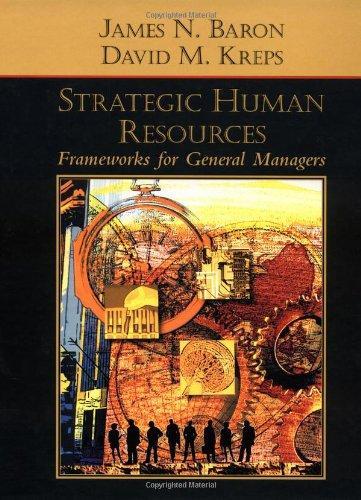 14.0%OFF
14.0%OFF

Download App
| >> | LShop | >> | Book | >> | Economics, Finance, ... | >> | Business & Managemen... | >> | Strategic Human Reso... |
 14.0%OFF
14.0%OFF
Strategic Human Resources: Frameworks for General Managers
-
ISBN
:
9780471072539
-
Publisher
:
John Wiley & Sons
-
Subject
:
Business & Management
-
Binding
:
Hardcover
₹
12620.0
 14.0% OFF
14.0% OFF
₹
10853.0
Buy Now
Shipping charges are applicable for books below Rs. 101.0
View Details(Imported Edition) Estimated Shipping Time : 15-18 Business Days
View Details-
Description
Human Resources are the most important resource that a firm commands and should be regarded as capital, a factor of production in which managers invest today in order to realize future profits. This book deals with the strategic implications of Human Resource Management as an important strategic asset and emphasizes its importance within the overall strategy of the firm. The book covers issues such as job design, evaluation, recruitment, training, career concern, and outsourcing and downsizing. The linkage between the various pieces of HRM policy are stressed and how the policies are related to management issues such as TQM, just-in-time manufacturing, and others. The book is aimed at the general manager, not the HRM practitioner and it stresses conceptual frameworks, not procedural methodology.
-
Author Biography
About the Authors James N. Baron is the Walter Kenneth Kilpatrick Professor of Organizational Behavior and Human Resources at Stanford University's Graduate School of Business. He has received numerous professional awards and honors, including a fellowship at the Center for Advanced Study in the Behavioral Sciences and elected membership in the Sociological Research Association and Macro Organizational Behavior Society. He has served as an advisor on human resource issues to corporations, law firms, government agencies, and nonprofit organizations. David M. Kreps is the Paul E. Holden Professor of Economics at the Stanford Graduate School of Business, and is a Senior Professor by Special Appointment at the Eitan Berglas School of Economics, Tel Aviv University. He is a Fellow of the Econometric Society and the American Academy of Arts and Sciences, and is a member of the National Academy of Sciences. In 1989, he was awarded the John Bates Clark Medal from the American Economic Association.












 10853.0
10853.0







